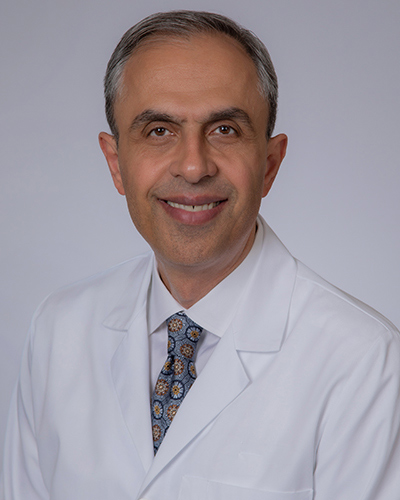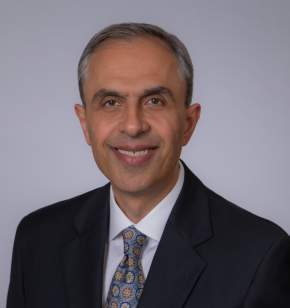Pediatric Neurosurgery

- What Is a Pediatric Neurosurgeon?
- Pediatric Neurologist vs. Pediatric Neurosurgeon
- What Types of Diseases Are Treated by a Pediatric Neurosurgeon?
- Where To Find a Pediatric Neurosurgeon
- Pediatric Neurosurgeons and Second Opinions
- Does a Pediatric Neurosurgeon Work With Other Doctors?
- Education Requirements for Pediatric Neurosurgeons
- Key Takeaways

Figure 1: Harvey Cushing, the father of modern neurosurgery, is seen in a picture with one of his pediatric patients after brain tumor surgery (Circa 1924.)
Are you trying to find out more about pediatric neurosurgeons? As you journey into the unknown world of neurosurgery, it’s valuable to learn more about the specialists and subspecialists who work in the field.
Pediatric neurosurgeons evaluate, diagnose, and treat childhood diseases related to the brain and spinal cord. Pediatric neurosurgeons will operate under various subspecialties, including spine, oncology, and congenital malformations. Some pediatric neurosurgeons practice privately, while others are affiliated with an academic center.
This article will explain what pediatric neurosurgeons do, and how they collaborate with other healthcare professionals.
What Is a Pediatric Neurosurgeon?
Pediatric neurosurgeons treat diseases of the central nervous system (brain and spinal cord.) These ailments could be related to benign brain tumors or cancers, blood vessel malformations, or congenital abnormalities.
Pediatric neurosurgeons will treat infants to teenagers, usually from birth through sixteen years of age, depending on their specialty. However, some pediatric neurosurgeons will also assist and treat young adult patients.
The pediatric neurosurgeon has a rigorous education. He or she often undergoes a residency training that lasts seven years, with another year or more for a fellowship, depending on his or her specialty and program.
Pediatric Neurologist vs. Pediatric Neurosurgeon
The pediatric neurosurgeon often works closely with a neurologist. The neurologist is an expert in the medical management of nervous system disorders, including the spine and brain. Neurologists may also work with neurosurgeons to monitor patients’ recovery and post-surgical rehabilitation.
Some people ask: what's the difference between a neurologist and a neurosurgeon? Both neurologists and neurosurgeons work together to care for their patients. However, these two highly trained physicians do have some differences.
A neurologist will assess, diagnose, and refer patients as well as provide medical treatment; however, they don't perform surgery. The pediatric neurosurgeon is in the operating room, performing hands on surgery.
Let’s talk about what types of neurologic ailments pediatric neurosurgeons treat.
Why should you have your surgery with Dr. Cohen?
Dr. Cohen
- 7,500+ specialized surgeries performed by your chosen surgeon
- More personalized care
- Extensive experience = higher success rate and quicker recovery times
Major Health Centers
- No control over choosing the surgeon caring for you
- One-size-fits-all care
- Less specialization
For more reasons, please click here.
What Types of Diseases Are Treated by a Pediatric Neurosurgeon?
Some pediatric neurosurgeons have a good understanding of many conditions (sometimes referred to as a generalist). At the same time, other surgeons have a comprehensive understanding of a more limited number of diseases (also known as a specialist).
Here are several conditions pediatric neurosurgeons treat:
- Brain tumors: This includes gliomas, craniopharyngiomas, ependymomas, and germ cell tumors.
- Neurovascular (nerves/blood vessels) disorders: Including arteriovenous malformations and cavernous malformations.
- Spinal cord tumors: Including ependymomas and gliomas.
- Other disorders: Head and spine deformities, brain and spine injuries, gait abnormalities (spasticity), as well as neurological birth defects and injuries.
How do you find a pediatric neurosurgeon? We'll talk about this in the next section.
Where To Find a Pediatric Neurosurgeon
Pediatric neurosurgeons are often found in large university-based academic hospitals. It is rare to find these specialists in private practice and in more rural areas. This often has to do with requirements for pediatric intensive care units (PICUs) and specialized nursing that is required when caring for pediatric patients.
Here are several common places where you’ll find a pediatric neurosurgeon:
- University-based hospitals. These surgeons as engaged in teaching, research and are often referred to as academic pediatric neurosurgeons. Here is where you will find cutting edge clinical trials and pediatric specialties for rare diseases.
- Community hospitals. Large private hospital systems often have pediatric neurosurgeons on call for emergencies and non-emergency cases. Community hospitals often provide care for a wide area and are ground zero for pediatric critical care.
- Private clinics. Some pediatric neurosurgeons have their own clinics. Often, these surgeons have surgical access at a local major hospital. This situation is becoming rarer as physician and surgeons are more commonly joining healthcare networks.
Now, let’s talk about how pediatric neurosurgeons can impact second opinions.
Pediatric Neurosurgeons and Second Opinions
There are a few things to consider when it comes to second opinions. First, if you're in a rural area, you may need to travel to find another qualified pediatric neurosurgeon at a university center.
Second, if you've sought the opinion of a hospital-based or employed physician, he is she is more likely to refer you to someone within their own network. On the other hand, pediatric neurosurgeons in private practice often have freedom to refer patients wherever they’d consider best, including colleagues at other large academic institutions who may have more experience and mastery of complex pediatric neurosurgical conditions.
Therefore, the location and affiliation of neurosurgical services can impact the ease of second opinions.
Does a Pediatric Neurosurgeon Work With Other Doctors?
In addition to neurological specialists, the pediatric neurosurgeon also works with other physicians.
Other pediatric neurosurgical partners include,
- Pediatricians: This group of physicians are obviously important for the overall care of children and essentially act as the “gatekeepers” and “quarterbacks” of pediatric care.
- Radiologists: These physicians are trained to administer and read diagnostic imaging tests associated with neurological conditions. These tests may include CT scans and MRIs.
- Pediatric oncologists: When neurosurgeons treat cancers and other benign tumors, they will work closely with oncologists to diagnose and determine treatment strategies.
- Pediatric neurologists: These doctors are engaged in medical treatment of neurological conditions.
- Emergency physicians: Pediatric neurosurgeons at a trauma center work closely with emergency room doctors.
Let’s briefly explore the education and training of a pediatric neurosurgeon.
Education Requirements for Pediatric Neurosurgeons
Overall, pediatric neurosurgeons go through nearly sixteen years of training. Starting with four years of undergraduate study, four years in medical school, seven years in residency, and sometimes another year or more of fellowship.
However, pediatric neurosurgeons don't stop there. Most pediatric neurosurgeons view their work as a passion to help children, not just a job. Most of them study for their entire career, constantly researching and innovating better ways to care for their patients.
Key Takeaways
- Pediatric neurosurgeons treat children suffering from diseases of the brain and spinal cord.
- Pediatric neurosurgeons are often found in large academic centers with dedicated children’s hospitals, though many of these centers act as a referral center for smaller and more rural health care centers.
- Centralization of these specialty-trained surgeons provides them with the pooled resources such as pediatric intensive care units (PICU) and specialty nursing.
- Pediatric neurosurgeons have extensive training and continually strive to uncover better ways to treat neurological disease.











